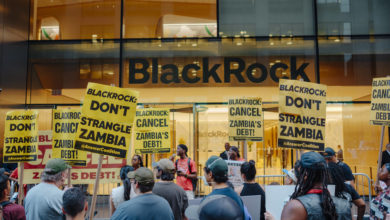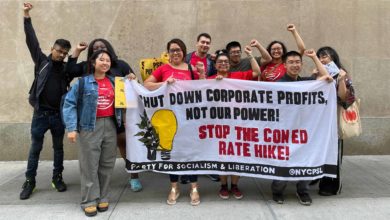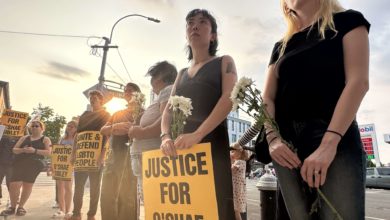On August 15, members of the Party for Socialism and Liberation and many other community members and organizations stood in solidarity with East Harlem street vendors as they appealed the thousands of dollars they had received in fines to the court.
The heavy media presence, mainly from Latino mainstream outlets like Univision and El Diario, allowed supporters to go inside. Judge Morrick, the presiding judge, did not have the power to reduce the fines but simply to determine if the person should or should not pay the fines.
One East Harlem street vendor, Aurora Diaz, also known as Doña Lola, had $5,000 in fines from the Department of Environmental Protection. She received multiple penalties; one was for being an unlicensed mobile food vendor and the other for having an unpermitted mobile unit. Lola entered the courtroom believing she had 5 fines this year and exited learning she had two additional fines!
The Street Vendor Project, an organization working to create a vendors movement as well as spreading awareness about vendors’ legal rights and responsibilities, explains that food vendors need a license for themselves in order to sell food and a permit from the Department of Health to sell from a pushcart. Since the 1980s, NYC law has not changed its original decision to grant 3,000 food vendor permits and 1,000 seasonal permits (i.e. ice cream vendors). You must apply or renew these permits in person.
Due to the difficulty in obtaining permits, a black market has emerged where new vendors “rent” permits from someone who already has a permit and pay them a part of their earnings. Black market permits can cost up to $25,000. If workers cannot dish out this money, then they risk paying fines for working without a permit.
In addition, there is also a cap on the number of pushcart permits available — 3,000 citywide. In addition, if you want to sell merchandise, you cannot, because in 1979, the city capped the number of these permits at 853, if you are not a veteran. There has been a waiting list from the Department of Consumer Affairs for licenses to sell merchandise since 1992! This entire process makes it incredibly difficult to become a street vendor, a group that pays $71.2 million in taxes to the city and many of whom are immigrants.
Doña Lola sells tacos and enchiladas in El Barrio. Through this work she has been able to sustain her three sons, and also she also pays taxes to the Department of Tax and Finance as a matter of compliance. Doña Lola expressed concern about how high the fines are and how there is no way to reduce them or work out a payment plan. She is one of many women workers being targeted for selling food. Doña Lola also reports that the Department of Sanitation tossed her food on top of giving her a fine.
Rosalba Torres, another woman street vendor based in East Harlem, was also in court with a fine of $1,000 for selling hot food. She has a food vendor license, but did not have a mobile unit license. Both women explained that they have tried to get mobile unit licenses but the waiting period is 15 to 20 years as there’s a limit to the number of permits given per year.
As if paying exorbitant fines isn’t enough, Spanish-speaking workers cannot communicate their concerns in court. Workers cannot bring their own translators because the “court will provide you with one.” The
court-provided translators, however, are only available over the phone, and often, the workers have trouble understanding them. This only adds to the intimidation workers feel as they confront the so-called justice system.
Street vendors in El Barrio are punished for not obtaining unobtainable permits. They are punished for not speaking English. They are punished for attempting to survive in a bureaucratic system seeking to squeeze money and profits off of people’s suffering.
It’s no coincidence that the harassment of street vendors has taken place at the same time that many local businesses are closing in East Harlem. As more real-estate developers (the real gentrifiers) come in to build more condos and chain stores such as Walgreens, the pressure for police to “clean up” the neighborhood also increases.
Broken Windows policing, a policy reintroduced to NYC policing under soon-to-be-former Police Commissioner Bratton, punishes people for minor infractions and violations such as spitting on the sidewalk, fare-beating, or vending too close to the crosswalk. Broken Windows also specifically targets people from oppressed nationalities and shows increased rates in gentrifying neighborhoods.
All progressive and revolutionary people should stand with the street vendors who are organizing against these ridiculous fines. All workers have a right to a job regardless of their legal status within the U.S. and
all people should be able to work without the fear of police harassment!







